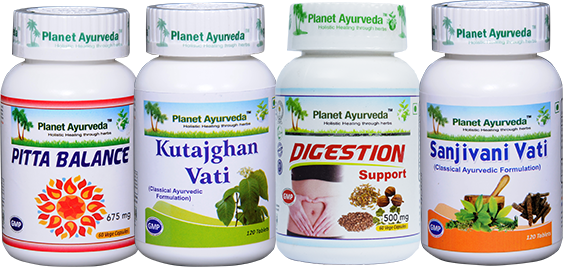Ayurvedic Cure of Irritable Bowel Syndrome – Natural Treatment
ABSTRACT
Irritable bowel syndrome is a chronic disease. It is a gastrointestinal disease and across the world, it affects 10%-30% of the population. The changes in lifestyle, diet and physical activities are responsible for this syndrome. In ayurveda, it is correlated with grahani. In this article, we are going to discuss irritable bowel syndrome (Grahani).
INTRODUCTION
It is a gastrointestinal syndrome which causes discomfort or pain in the abdomen and changes in bowel habits which may be constipation, diarrhea or both. It affects both adults and children. Due to bowel habits, it is also called Gut-brain interaction.

TYPES OF IRRITABLE BOWEL SYNDROME
There are three types of IBS which are based on changes in bowel movements.
- IBS-C
- IBS-D
- IBS-M
1. IBS-C
In this type of irritable bowel syndrome, there is constipation. In this, there are fewer bowel movements and may strain while passing stool. The consistency of stools in IBS-C is 25% hard and lumpy, and fewer than 25% are loose.
2. IBS-D
In this type of irritable bowel syndrome, there is diarrhea. In this, there are frequent bowel movements. The consistency of stools in IBS-D is more than 25% loose and less than 25% are hard.
3. IBS-M
In this type of irritable bowel syndrome, there are mixed bowel habits. It is also known as alternating bowel habits (IBS-M). The consistency of stools in IBS-M is both loose and watery and other times hard and lumpy.
CAUSES OF IRRITABLE BOWEL SYNDROME
The cause of irritable bowel syndrome is not known but there are some problems which are common in patients with irritable bowel syndrome. These problems include:
- Early life stress
- Bacterial overgrowth in the intestine
- Bacterial infection in the digestive tract
- Food allergy
- Changes in gut microbes
- Muscle contraction in the intestine
SYMPTOMS OF IRRITABLE BOWEL SYNDROME
- Abdominal pain
- Bloating
- Cramping
- Weight loss
- Iron deficiency anemia
- Whitish mucus in stool
- Diarrhoea
- Constipation
- Acidity
- Fullness
DIAGNOSIS OF IRRITABLE BOWEL SYNDROME
- Colonoscopy (to identify precancerous polyps).
- CT scan (to find out the cause of abdominal pain).
- Breath test (to measure hydrogen gas level in the breath).
- Stool test (to see any inflammation, bacteria and blood in the gastrointestinal tract).
- Blood test – IBSchek and IBS-smart (test for certain antibodies related to post infectious IBS).
TREATMENT OF IRRITABLE BOWEL SYNDROME
In allopathic treatment, anti-inflammatories, antidepressants, antibiotics and pain medications are used for the symptomatic treatment of Irritable bowel syndrome but they cause side effects.
COMPLICATIONS OF IRRITABLE BOWEL SYNDROME
- Depression
- Anxiety
- Haemorrhoids
- Weight loss
AYURVEDIC ASPECT OF IRRITABLE BOWEL DISEASE
In Ayurveda Irritable bowel disease is correlated with Grahani.
अग्न्याधिष्ठानमन्नस्य ग्रहणाद ग्रहणी मता। नाभेरूपरि सा ह्यग्निबलोपस्तम्भबृंहिता।।
अपक्वं धारयत्यन्नं पक्वं सृजति पाशर्वत:। दुर्बलाग्निबला दुष्टा त्वाममेव विमुच्चति।। (च. चि.५६-५७)
According to Acharya Charak, grahani is the seat of agni and because of holding up the food it is called as Grahani. It is situated above umblicusand is strengthened by the power of agni. Normally, it holds up the food and releases it from the side after it is digested but when it is unbalanced due to weak digestive fire it releases the ingested material even in incomplete condition.
TYPES OF GRAHANI ( IRRITABLE BOWEL SYNDROME)
- VATAJ GRAHANI (IRRITABLE BOWEL SYNDROME)
- PITTAJ GRAHANI (IRRITABLE BOWEL SYNDROME)
- KAPHAJ GRAHANI (IRRITABLE BOWEL SYNDROME)
- TRIDOSHA GRAHANI(IRRITABLE BOWEL SYNDROME)
1. VATAJ GRAHANI (IRRITABLE BOWEL SYNDROME)
SAMPRAPTI (PATHOPHYSIOLOGY) OF VATAJ GRAHANI (IRRITABLE BOWEL SYNDROME)
कटुतिक्तकषायातिरुक्षशीताल्पभोजनै:। प्रमितानशनात्यध्ववेगनिग्रहमैथुनै:।।
मारुत: कुपितो वह्निं सञ्छाघ कुरुते गदान ।। (च. चि. ५९)
The vitiation of vayu due to intake of pungent, bitter, astringent, too rough and cold food articles, little or no food, too much traveling on foot, sexual intercourse, suppression of urges, envelops the agni and thus makes it sluggish and cause vataj grahani.
CLINICAL FEATURES OF VATAJ GRAHANI
- Dryness in mouth and throat
- Blurred vision
- Excessive thirst and hunger
- Hyperacidity
- Piercing pain in the abdomen
- Cardiac pain
- Frequent pain in thighs, groins and neck
- Tinnitus
- Abnormal taste in the mouth
2. PITTAJ GRAHANI
SAMPRAPTI (PATHOPHYSIOLOGY) OF PITTAJ GRAHANI (IRRITABLE BOWEL SYNDROME)
दाह्यम्लक्षाराद्यै: पित्तमुल्बणम।
अग्निमाप्लावयद्धन्ति जलं तप्तमिवानलम ।। (च.चि.६५)
With the intake of pungent, uncooked, burning, sour, alkaline food etc. pitta gets aggravated and extinguishes the fire by flooding over like hot water and causing pittaja grahani.
CLINICAL FEATURES OF PITTAJ GRAHANI (IRRITABLE BOWEL SYNDROME)
- Loose stool containing undigested material
- Color of stool is bluish-yellow
- Anorexia
- Excessive thirst
- Burning sensation in the cardiac region
- Burning sensation in throat
3. KAPHAJ GRAHANI
SAMPRAPTI (PATHOPHYSIOLOGY) OF KAPHAJ GRAHANI (IRRITABLE BOWEL SYNDROME)
गुर्वतिस्निग्धशीतादिभोजनादतिभोजनात।भुक्त मात्रस्य च स्वप्नाद्धन्त्यग्निं कुपित: कफ:।।
(च.चि. ६७)
Kapha is aggravated by the intake of food which is heavy, too cold etc. Over-eating and sleeping just after meals extinguishes the fire and causes kaphaja grahani.
CLINICAL FEATURES OF KAPHAJA GRAHANI (IRRITABLE BOWEL SYNDROME)
- Difficulty in food digestion
- Nausea
- Vomiting
- Anorexia
- Heaviness in the abdomen
- Sweetness in mouth
- Cough
- Numbness
4. TRIDOSHA GRAHANI
SAMPRAPTI (PATHOPHYSIOLOGY) OF TRIDOSHA GRAHANI (IRRITABLE BOWEL SYNDROME)
पृथग्वातादिनिर्दिष्टहेतुलिंगसमागमे। त्रिदोषं निर्दिशेतेषां भेषजं शृण्वत: परम।। (च.चि.७२)
When the etiology and symptoms of vata, pitta and kapha are described separately, the condition is said to be caused by three doshas.
TREATMENT OF GRAHANI (IRRITABLE BOWEL SYNDROME)
According to Planet Ayurveda, the proper diet, daily lifestyle and Ayurvedic medication is important for better results without any side effects under the guidance of the doctor. There is a proper care pack of herbal remedies for the cure of Grahani (Irritable bowel syndrome). It is given below with ingredients that are used in these remedies.
HERBAL REMEDIES BY PLANET AYURVEDA FOR GRAHANI (IRRITABLE BOWEL SYNDROME)
Planet ayurveda is a GMP – certified clinical and ISO 9001:2015 certified US FDA-registered company. In Planet Ayurveda, the formulation of various remedies from the holistic system of ayurveda to provide relief from disease is manufactured here. In Planet Ayurveda, formulations are preservative, chemical and additive free. For Grahani (Irritable bowel syndrome), Planet ayurveda provides various supplements without causing any side effects.
PRODUCT LIST
- PITTA BALANCE
- KUTAJGHAN VATI
- DIGESTION SUPPORT
- SANJIVANI VATI
1. PITTA BALANCE
Pitta balance is a polyherbal capsule which is formulated by Planet Ayurveda using Jahar mohar pishti, Kaharwa pishti, Akik pishti, Mukta pishti and Giloy (Tinospora cordifolia) satva (extract). These formulated capsules are used in balancing the aggravated pitta dosha in the body. It provides a cooling effect to the body.
Dosage – After meals 1 capsule twice a day with warm water.
2. KUTAJGHAN VATI
Kutajghan vati is a polyherbal tablet which is formulated by Planet Ayurveda using Kutaj (Holarrhena antidysenterica) and Ativisha (Aconitum heterophyllum). This medicine is effective in diarrhea and dysentery. It has the potency to increase the digestive fire.
Dosage – After meals 2 tablets twice a day with warm water.
3. DIGESTION SUPPORT
Digestion support is a polyherbal capsule which is formulated by planet ayurveda using Amla (Emblica officinalis), Haritaki (Terminalia chebula), Bahera (Terminalia bellerica), Saunf (Foeniculum vulgare), Dhaniya (Coriander sativum), Pippali (Piper longum) and Jeerak (Cyminum cuminum). It induces strength in the intestine and helps in maintaining the natural pH balance in the stomach.
Dosage – After meals 1 capsule twice daily with warm water.
4. SANJIVANI VATI
Sanjivani vati is a polyherbal tablet which is formulated by planet ayurveda using Vidanga (Embelia ribes), Ginger root ( Zingiber officinale), Pippali (piper longum), Haritaki (Terminalia chebula), Amalaki (Emblica officinalis), Vacha (Acorus calmus), Guduchi herb (Tinospora cordifolia), Shuddh bhallataka (Semecarpus anacardium), Shuddh vatsnabh (Aconitum ferox). It provides natural bile juices and it helps in burning the accumulated metabolites. It helps in flushing out the toxins from the stomach.
Dosage – After meals 2 tablets twice daily with warm water.
CONCLUSION
The pain and discomfort in the abdomen with changes in bowel habits is called irritable bowel syndrome. It is a gastrointestinal syndrome. In ayurveda it is correlated with grahani. The symptoms and causes of vata, pitta and kapha grahani are different. In Planet Ayurveda, to treat irritable bowel syndrome (Grahani) planet ayurveda provides self-made supplements without any preservatives and without causing any side effects. Planet Ayurveda provides an IBS care pack which is best for the treatment of Irritable bowel disease.






